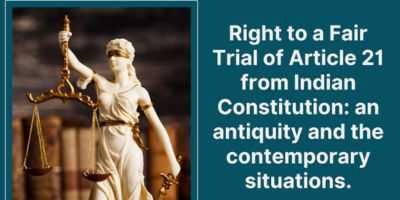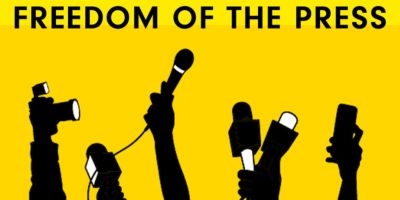Media Trials: Establishing Guidelines to Balance Freedom of Press with Fair Trial.
In democratic societies, the media plays a crucial role in shaping public opinion and keeping authorities accountable. However, when media coverage turns into a trial by the press, it raises serious concerns about justice and fair trial rights.
What is a media trial?
It refers to the excessive coverage of legal cases by the press, often influencing public perception and, at times, judicial outcomes. While the Freedom of the Press is essential for democracy, it must be balanced with the Right to a Fair Trial.
This blog explores famous cases of Media Trials in India, its implications, and potential guidelines to strike a balance between press freedom and judicial integrity.

A media trial occurs when the press plays the role of judge, jury, and executioner by heavily reporting and analyzing legal cases. It often leads to public scrutiny, character assassination and bias. This takes place even prior to the Court’s verdict.
The phenomenon gained prominence with the rise of 24/7 news channels and social media, where information spreads rapidly, influencing mass opinions.
Key Characteristics of Media Trials:
- Sensationalized coverage of Criminal cases.
- Public debates and social media campaigns influencing legal proceedings.
- Violation of the presumption of innocence.
- Use of selective leaks and unverified information.
- Pressure on law enforcement agencies and judiciary.
Landmark Cases of Media Trial in India.
1. Jessica Lal Murder Case (1999)
One of the earliest media trials, the case of Jessica Lal’s murder became a landmark. in Indian legal history. After initial acquittal, public outrage fuelled by media pressure led to a retrial, eventually resulting in the conviction of the accused.
2. Aarushi Talwar Murder Case (2008)
This case saw excessive media speculation, with multiple conspiracy theories influencing public opinion. The CBI court convicted the parents, but the High Court later acquitted them, highlighting how media trials can distort justice.
3. Sushant Singh Rajput Case (2020)
A tragic case turned into a media frenzy, with widespread allegations, defamation, and media-led investigations. The aggressive coverage deeply affected the individuals involved, raising ethical concerns about journalistic responsibility.
4. Rhea Chakraborty Drug Case (2020)
Following Sushant Singh Rajput’s death, actress Rhea Chakraborty faced intense media scrutiny. News channels conducted their own “investigations,” leading to mass hysteria, social media vilification, and a distorted narrative.
5. Indrani Mukerjea – Sheena Bora Murder Case (2015)
Media sensationalism around this case influenced public opinion, often portraying the accused as guilty before a legal verdict was reached. The excessive coverage overshadowed legal proceedings.
Legal Perspective: Media Trials and Judicial Fairness

1. Right to a Fair Trial (Article 21 of the Constitution)
A person accused of a crime has the right to a fair trial under Article 21. Media trials can jeopardize this right by influencing witnesses, judges, and jurors.
2. Contempt of Court (Contempt of Courts Act, 1971)
When media coverage interferes with ongoing judicial proceedings, it can amount to contempt of court. The Supreme Court has often warned against prejudicial reporting.

3. Freedom of Press (Article 19(1)(a))
The press enjoys freedom of speech and expression, but this right is subject to “reasonable restrictions” under Article 19(2), especially when it affects the administration of justice.

4. Sub-Judice Rule
The media is expected not to discuss cases that are under judicial consideration, preventing undue influence on the proceedings. However, this principle is often ignored in high-profile cases.
Establishing Guidelines to Balance Press Freedom and Fair Trial
To maintain journalistic integrity while ensuring fair trials, the following guidelines must be adopted:
1. Restriction on Premature Conclusions
Media should refrain from labeling the accused as guilty before the court delivers a verdict. The presumption of innocence must be upheld.
2. Responsible Reporting
Journalists should verify facts before reporting, avoiding speculation, leaked evidence, and biased narratives. Ethical journalism should prioritize truth over sensationalism.
3. Judicial Oversight on High-Profile Cases
Courts can issue temporary restrictions on media coverage for sensitive cases, ensuring trials remain unaffected by public opinion.
4. Media Self-Regulation
News organizations should enforce self-regulatory codes of conduct to prevent unethical reporting. The Press Council of India and News Broadcasting Standards Authority (NBSA) must be more proactive.
5. Social Media Accountability
With misinformation spreading rapidly on social media, platforms should enforce strict policies against prejudicial content related to ongoing trials.
6. Educating the Public on Media Ethics
Awareness campaigns should be conducted to educate viewers about media trials’ impact, encouraging responsible consumption of news.
Conclusion
While the media plays a vital role in upholding democracy, laws related to women’s rights in India, corruption scandals, and criminal cases require ethical reporting. The balance between press freedom and a fair trial is delicate and must be preserved through responsible journalism, judicial intervention, and public awareness.
By following established guidelines, we can ensure that what is a media trial does not turn into a tool of injustice but remains a powerful force for accountability and truth.
famous cases of media trial in India, what is media trial, media trial examples, what is media trial in India, media trial research paper, Right to fair trial in India, Trial by media, Right to fair trial in India, Media trial Supreme Court, Media ethics in India, Role of media in legal trials, Legal limitations on media in India
